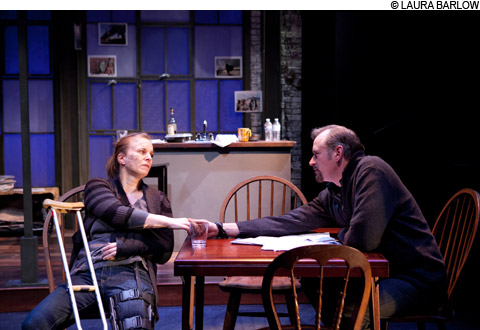
CONFLICT RESOLUTION Beneath the moral debate about war journalism, Time Stands Still is, at heart, a relationship play. |
Is war correspondence a calling or a kick? Pulitzer-winning dramatist Donald Margulies asks, though he doesn't necessarily answer, that question in Time Stands Still, his characteristically intelligent, Tony-nominated 2009 play,receiving a sharp area premiere by the Lyric Stage Company of Boston (through March 17).Sarah Goodwin is a celebrated photojournalist returning stateside after being severely injured by a roadside bomb in Iraq. Arm in a sling, one leg buckled into a splint, face lightly marred by shrapnel, she is helped across the threshold of their Brooklyn loft by longtime partner James Dodd, a previously embedded reporter who preceded her home following a breakdown caused by being close enough to a bombing to get blood in his eyes. He thinks it's time to put bearing witness behind them and live a comfortable life. But the tougher, more abrasive Sarah may be an unstoppable heroine — or a war junkie.
Margulies wedges into his story some hefty chunks of moral debate about the worthiness vs. intrusiveness of conflict journalism, and to his credit he does so naturally. But Time Stands Still is at heart a relationship play that, like the author's Dinner with Friends, examines the ramifications on different individuals of a cataclysmic event — in this case not a divorce but Sarah's narrow brush with death (which, in her liaison with James, followed an infidelity).
Also in for the ripple effect is Sarah's mentor and onetime lover, middle-aged magazine photo editor Richard Ehrlich, who turns up to welcome her home with a much younger, ditzy if tenderhearted, pregnant girlfriend, the tellingly named Mandy Bloom, who comes bearing welcome-home and get-well-soon balloons. "There's young," scoffs Sarah of Richard's new attachment, "and there's embryonic." But Richard has obviously decided to gather what roses he may, however barely budding. "Anything could happen to anyone," he tells Sarah. "You're a prime example."
The play, stretched over an accumulation of months and scenes, consists of conversation and conflict among these four, as Richard and Mandy become unlikely if over-the-moon parents, and Sarah tries to recover from her injuries and conform to James's new desires. There's a lot of wit, struggle, and, finally, sadness in the latter couple's interactions. And, of course, the situational spark is as topical as this morning's headlines. The program quotes New York Times journalist Lynsey Addario, who in 2011 was captured and detained in Libya: "At that point, it was hard to justify why I put myself in that situation. . . . Some of us contemplated whether we wanted to continue covering conflicts; whether it was worth the hardships we put our families through." And just last week, American journalist Marie Colvin and French photojournalist Remi Ochlik were killed by Syrian shelling.